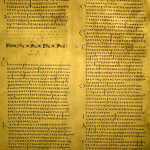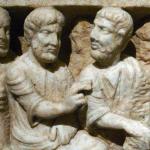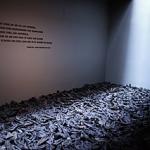Last Thursday at the office, right in the middle of her work day, my mother received an urgent phone call.
“Hey, Mom,” the caller began. “I know you’re busy running the ESOL program and compiling that annual review where your students write about being trapped in mudslides and bitten by mongeese and beaten with sjamboks by qat-chewing child soldiers, but I’m working on a piece about teachers, and I wanted to go over your Sister Leonida story.”
Sr. Leonida was a nun who taught geography at St. Athony’s Grammar School, in Trenton, New Jersey, in the years before Sputnik. One day, when my mother’s chocolate milk soaked through her textbook, Sister held the book aloft before the class and extemporized a homily on the vice of uncleanliness. It impressed my mother to the point where she became the cleanest person I’ve ever known, and to the point where she never — not once — gave me chocolate milk.
To do the event justice, I needed detail, and my mother, for all the competing demands on her time, provided. “Was the milk in a carton or a thermos?” “A carton. My parents had five — no, at that point, four — kids. Thermoses would have been a luxury.” “Did you carry it in a knapsack or a satchel?” “A satchel — a big, unsightly thing like a doctor’s bag. Girls didn’t start wearing knapsacks before second-wave feminism.” “What words did Sr. Leonida use?” “‘Disgraceful’ is the one I remember.” “What did Sister look like?” “At the time I thought she looked the Wicked Witch of the West, right down to the black, but she was probably this 23-year-old girl, fresh off the boat from Ireland, who’d stayed up all night reading –” “Radclyffe Hall, under the covers?” “No, Max. Good God. She’d probably been reading our essays on Grace.”
My mother is my muse. Not my only muse, of course, but definitely in the top ten. In small measure, this is by default. Unlike many people, my mother doesn’t mind being written about. Much more decisive is the fact that she’s a genuine character, a sweet and crunchy trail mix of quirks and virtues. If I were Mary Karr, I could add “vices,” but I’m luckier in that respect that Mary was. Because my mother is the kind of person she is, making her my subject enables me to pull off the writer’s hat trick of being truthful and entertaining without hurting anyone.
In a way, that policy sounds self-defeating. Wouldn’t I be a better writer, a more relevant writer — in a word, a more serious writer — if I were to write about someone or something toward which my feelings were a little more complicated? Well, yes, and for what it’s worth, I’m trying to do that already. That thing, that grand, all-absorbing theme, is the eternal conflict between the demands of religion and the desires of the individual. It’s a tough one. I am, after all, billed not as a generic writer; nor is my readership a generic readership. I’m a Catholic, writing on Patheos’ Catholic channel, for other Catholics. That tends to fix the fight. Unless I let religion win, I’m letting myself in for a heap of trouble — combox darts, burnt bridges, and (for all I know) canon-legal penalties.
One of these days I’d like to take a detour around all of it by graduating to fiction. But I’ve learned in the meantime to relish the challenge: How to make compromise and ambivalence digestible in the middle of a culture war? Here’s where invoking my mother — divorcée, feminist, and non-believer that she is — really comes in handy. Abstemious in her habits, a tireless member of the helping professions, committed to the same man for 29 years and counting, she is walking, talking, proof that liberalism is a little less awful than its Catholic critics allow. People can and do choose good over evil, even without help from pope, king, or executioner.
I have to be careful here. If you were to ask my mother to name the thinker most responsible for shaping her view of the world, she’d probably tell you John Stuart Mill. Though I’m in no position to contradict her, I’ve never been able to ignore great gouts and gobs of Church stuck in the grooves of her personality. Just listen to her after a tacky funeral, or standing at the threshhold of a pricey boutique, or facing a cluttered coffee table. You will know for a fact that Sr. Leonida’s seeds did not fall in a rocky place.
But, even with due credit given to a dozen years of parochial school (plus one at CUA), my mother still makes a good instrument of subversion. Among Catholic pundits, there’s a tendency to paint horns and hooves onto the opposition, whether that opposition be external, like the president, or internal, like the LCWR sisters. That’s fine — it’s their job. A prophet doesn’t have time to equivocate. Here, my mother’s career can serve as a reminder that the wheat and chaff aren’t quite so easy to separate. Even if the Church isn’t running a cafeteria, nobody can stop it from being a take-out joint.
Among readers, my mother’s a hit. I often field comments along the lines of “I just have to meet your mother,” or better, “More Max’s Mom, please!” Most of them come from women who belong to the half-generation after hers. Though they’re generally orthodox Catholics, they also give the impression, as I’ve gotten to know them, that they’re fed up with boomer-bashing (even when boomers do it themselves). That suggests to me that she works on terms very much like the ones I have in mind.
Of course, to my mother’s own way of thinking, her life isn’t a series of statements; it’s a life. Normally, that’s exactly how I try treat her — obvious subversion is bad subversion. But a few weeks ago, when I gave my game away by linking her views on the various popes and her residence on the Upper West Side, she sent me an e-mail with “ALLISON PORCHNIK SPEAKS” in the subject line. Inside was a link to a clip from Annie Hall, where Alby Singer (Woody Allen) tries chatting up Allison Porchnik (Carole Kane):
AS: What’s your name?
AP: Allison.
AS: You’re, like, New York, Jewish, left-wing, liberal intellectual, Central Park West, Brandeis University, socialist summer camps, father with the Ben Shahn drawings, right? And the really, uh, strike-oriented, kind of…stop me before I make a complete imbecile of myself.
AP: No, that was wonderful. I love being reduced to a cultural stereotype.
I wrote back: “Point taken.”
Last night, my mother wrote me another e-mail. She said she liked the teacher piece as I’d written it “(though Sister Leonida ended up on the cutting-room floor).” The parentheses were hers, as was the right to complain after being subjected to a grueling mid-day interview. But the note of disappointment also made me wonder whether she just likes seeing herself mentioned under my byline, that is, knowing she moves me to write. So on this Mothers’ Day, I’m declaring to the world that yes, she does. That means I’m breaking no more than nine commandments, which is a pretty good start.















